Intro
Discover the 5 ABO Rh types, including A, B, AB, and O blood groups, and understand Rh positive and negative factors, blood compatibility, and transfusion requirements.
The ABO and Rh blood types are crucial components of our blood, determining our compatibility with others in medical procedures such as blood transfusions. Understanding these blood types is essential for maintaining health and preventing adverse reactions during medical treatments. The ABO blood types are classified into four main groups: A, B, AB, and O, while the Rh blood type is categorized as either Rh-positive or Rh-negative.
The importance of knowing one's blood type cannot be overstated, as it plays a critical role in ensuring safe blood transfusions and preventing potential health complications. In the context of transfusion medicine, the compatibility of blood types between donors and recipients is paramount. Incompatible blood types can lead to severe reactions, including anaphylaxis, kidney failure, and even death.
The discovery of the ABO blood group system by Karl Landsteiner in 1901 marked a significant milestone in the field of transfusion medicine. His work laid the foundation for the development of modern blood banking and transfusion practices. The subsequent discovery of the Rh blood type system by Alexander Wiener and Karl Landsteiner in 1940 further expanded our understanding of blood types and their role in transfusion medicine. Today, blood typing is a routine procedure in medical settings, enabling healthcare professionals to make informed decisions about blood transfusions and other medical interventions.
Introduction to ABO Blood Types
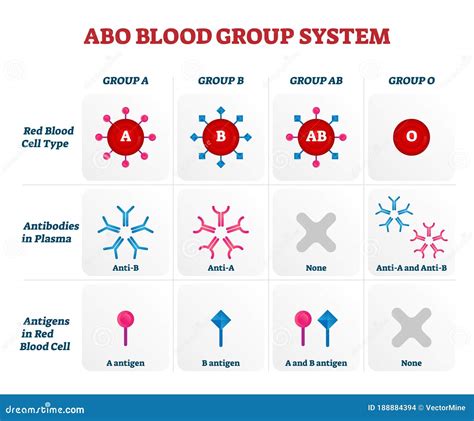
Each blood type has its unique characteristics and compatibility requirements. For instance, individuals with Type A blood can receive blood from Type A or Type O donors, but not from Type B or Type AB donors. Understanding these compatibility requirements is crucial for ensuring safe blood transfusions.
Understanding Rh Blood Types
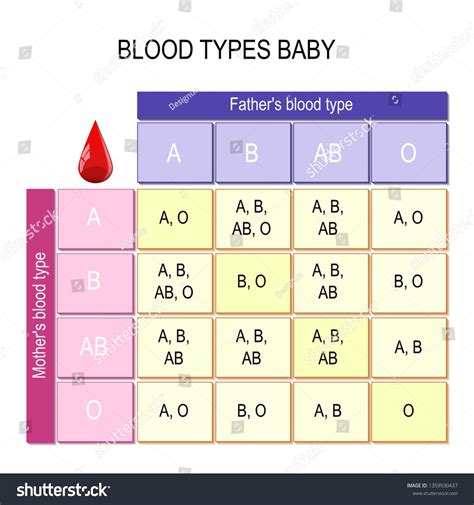
Importance of Rh Blood Type in Pregnancy
The Rh blood type plays a significant role in pregnancy, particularly if the mother is Rh-negative and the fetus is Rh-positive. In such cases, the mother's immune system may react to the Rh-positive blood of the fetus, leading to the production of antibodies that can attack the fetus's red blood cells. This condition, known as hemolytic disease of the newborn (HDN), can have severe consequences for the fetus. To prevent HDN, Rh-negative mothers are often administered Rh immune globulin during pregnancy to suppress the production of antibodies against the Rh-positive blood of the fetus.Benefits of Knowing Your Blood Type
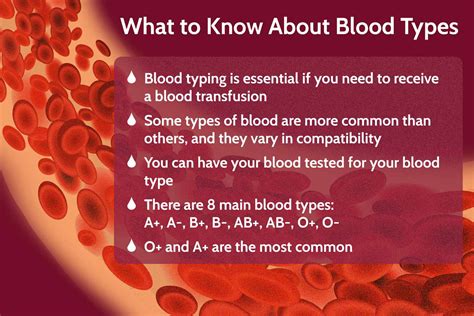
In addition to these benefits, knowing your blood type can also provide valuable insights into your genetic makeup and potential health risks. For instance, research has shown that certain blood types may be associated with an increased risk of developing specific diseases, such as heart disease or certain types of cancer.
How to Determine Your Blood Type
Determining your blood type is a relatively simple process that can be performed in a medical setting. The most common method involves a blood test, which detects the presence or absence of specific antigens on the surface of red blood cells. The test results will indicate your ABO blood type and Rh blood type, providing valuable information for medical decisions and transfusion purposes.
ABO and Rh Blood Type Compatibility
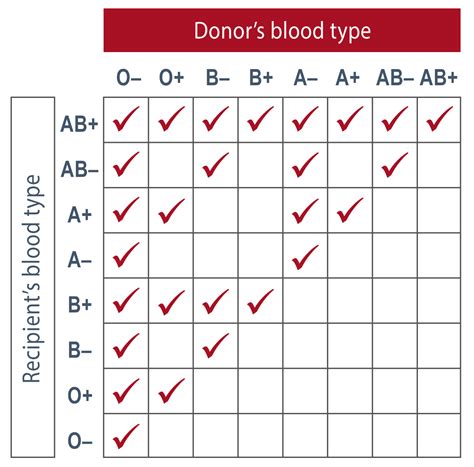 Understanding ABO and Rh blood type compatibility is critical for ensuring safe blood transfusions. The following chart summarizes the compatibility requirements for each blood type:
- Type A: Can receive from Type A or Type O
- Type B: Can receive from Type B or Type O
- Type AB: Can receive from Type AB, Type A, Type B, or Type O
- Type O: Can receive from Type O
Understanding ABO and Rh blood type compatibility is critical for ensuring safe blood transfusions. The following chart summarizes the compatibility requirements for each blood type:
- Type A: Can receive from Type A or Type O
- Type B: Can receive from Type B or Type O
- Type AB: Can receive from Type AB, Type A, Type B, or Type O
- Type O: Can receive from Type O

In terms of Rh compatibility, Rh-positive individuals can receive blood from Rh-positive or Rh-negative donors, while Rh-negative individuals can only receive blood from Rh-negative donors.
Practical Applications of Blood Typing
Blood typing has numerous practical applications in medical settings, including: - Blood transfusions - Organ transplantation - Pregnancy and childbirth - Medical researchIn each of these contexts, knowing an individual's blood type is essential for ensuring safe medical procedures and preventing adverse reactions.
Common Misconceptions About Blood Types
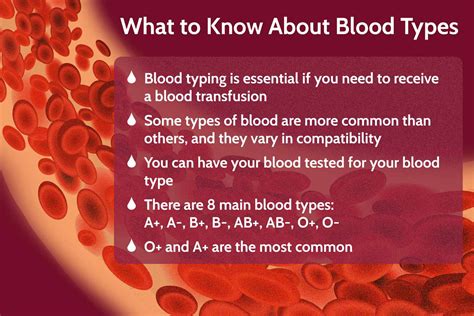
It is essential to separate fact from fiction when it comes to blood types, relying on scientific evidence and medical expertise to inform our understanding of this complex topic.
Future Directions in Blood Typing
The field of blood typing is continually evolving, with advances in medical technology and research leading to new insights and applications. Some potential future directions in blood typing include: - The development of more precise and efficient blood typing methods - The discovery of new blood types or subtypes - The exploration of blood type associations with specific diseases or health conditionsAs our understanding of blood types continues to grow, we can expect to see new and innovative applications of blood typing in medical settings, leading to improved health outcomes and enhanced patient care.
Conclusion and Next Steps

We invite you to share your thoughts and questions about blood types in the comments below. Have you had any personal experiences with blood typing or transfusions? What do you think are the most important aspects of blood type knowledge? Let's start a conversation and explore this fascinating topic further.
What are the main ABO blood types?
+The main ABO blood types are Type A, Type B, Type AB, and Type O, each determined by the presence or absence of specific antigens on the surface of red blood cells.
Why is it important to know my Rh blood type?
+Knowing your Rh blood type is crucial for preventing adverse reactions during medical treatments, particularly during pregnancy and childbirth, and for ensuring safe blood transfusions.
Can I change my blood type through diet or lifestyle modifications?
+No, blood type is determined by genetics and cannot be changed through diet or lifestyle modifications. It is essential to rely on scientific evidence and medical expertise when it comes to understanding blood types.
